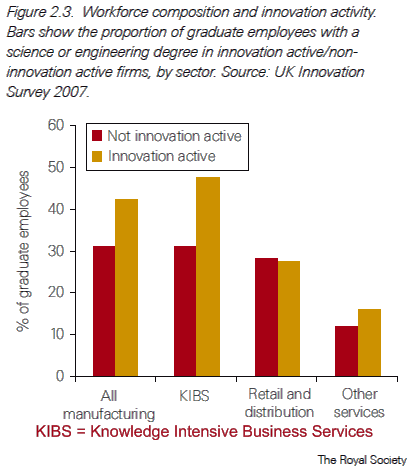
|
|
|
|
|
|
|
News & Views item - July 2009 |
![]() Royal Society: Hidden Wealth: the Contribution of Science to Service
Sector Innovation.
(July 23, 2009)
Royal Society: Hidden Wealth: the Contribution of Science to Service
Sector Innovation.
(July 23, 2009)
A major study on the role of science in UK services sector innovation has just
been published by the Royal Society. The 100 page report,
Hidden Wealth: the contribution of science to service sector innovation![]() ,
notes that the sector makes up around 75% of the UK economy and that science,
technology, engineering, and mathematics (STEM) is deeply embedded within the UK
service sectors. One of its key findings is that STEM is often embedded in the
form of human capital, infrastructure (e.g. computing and IT) and the
STEM capabilities of external consultancies.
,
notes that the sector makes up around 75% of the UK economy and that science,
technology, engineering, and mathematics (STEM) is deeply embedded within the UK
service sectors. One of its key findings is that STEM is often embedded in the
form of human capital, infrastructure (e.g. computing and IT) and the
STEM capabilities of external consultancies.
Professor David Rhind, chair of the Royal Society's report's working group said: "...little research has been done into how innovation, which drives the expansion of the service sector, develops. The Royal Society report identifies science, and related subjects, as startlingly significant in this development, which is intrinsically linked to the growth of the UK economy in the future and our emergence from recession.
"It is of great concern that services, innovation and the role of STEM are so poorly understood, leading to the lack of a coherent policy for service innovation. This deficiency makes the recommendations of the report all the more significant, as they provide a template for future policy, one which the UK urgently needs. We are delighted that the Bank of England and Research Councils have led the way in regard to our implementing our recommendations."
Whether or not Australia's policy wonks might consider it worthwhile to take an interest in what the RS has to say is a moot point.
The Royal Society's report details a number of measures that it believes would improve and assist the development of the UK service sector and innovation, considering in particular the public and banking sectors.
Some key recommendations included:
Research communities and agendas for the service sector should be built and supported.
Multi-disciplinary training should be developed in Higher Education institutions alongside more service sector placements to ensure relevant multi-disciplinary capabilities are acquired by STEM-trained personnel.
The scale of knowledge exchange between service organisations and public science base should be greatly increased.
Understanding of innovation in the service
sector and the role of STEM should be improved,
Organisation-specific recommendations included.
Research Councils, Bank of England and the Financial Services Authority (FSA) should ensure that the research base contributes to more effective modelling of systemic risk in financial services.
The Department of Business, Innovation and Skills, together with the Technology Strategy Board and Research Councils should develop one or more world-class, independent centres of modelling and risk assessment relevant to financial services.
Professor Ian Diamond, Chair of Research
Councils UK said: "The RCUK is now in dialogue with the Bank of England over
future research agendas and regards them as a key research partner."